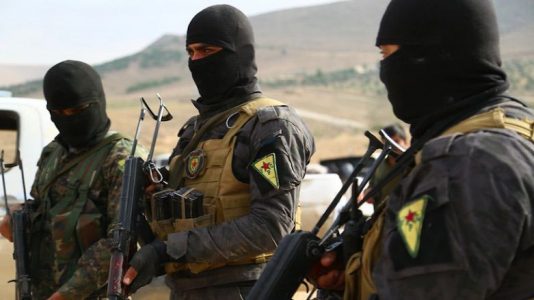
Syrian Defence Forces arrested five ISIS sleeper cell members in Manbij and Raqqaa
Counterterrorism units linked to the US-backed Syrian Democratic Forces (SDF) arrested five members of the so-called Islamic State among sleeper cells in Raqqa and Manbij, a senior official said on Wednesday.
Mustafa Bali, the head of the SDF press office in northeast Syria, wrote on Twitter that counterterrorism units had detained the five Islamic State members in “two separate successful raids in Raqqa and Manbij countryside.”
Counterterrorism units had also recently arrested four Islamic State sleeper cells in the Hasakah province, including Abu Bashir, a senior Islamic State leader on June 21.
“The authorities thank the citizens of the town for their cooperation and for remaining indoors while the operation was carried out,” Bali said at the time.
The SDF official called on citizens to report criminal activity in their areas to the local Kurdish-led forces.
A roadmap published by the US-led coalition for the defeat of the Islamic State following a meeting of senior coalition officials in Paris on Tuesday also underlined the threat of active sleeper cells.
The Islamic State “has used its active cells in the region to attack our partners and the civilian populations both in Iraq and in Syria where we have recently seen an increase of [ISIS] attacks in the Levant,” the joint statement said.
“This is a major concern for the entire Coalition, as it puts at risk key military gains and the stability necessary for recovery.”
Despite the SDF and the US-led coalition announcing the defeat of the terror group’s self-proclaimed caliphate on March 23, Islamic State sleeper cell attacks continue in Arab-majority areas that were liberated from the militants.
The US-led coalition confirmed that although a territorial defeat had been achieved, “the job to ensure a lasting defeat of [ISIS] is still to be done.”
The leadership in the Kurdistan Region has also warned of the Islamic State’s continued threat in both Syria and Iraq.
In a meeting on June 18 with the Commanding General for Special Forces of the US-led coalition, Major General Patrick Roberson, Kurdistan Regional Government (KRG) Prime Minister-designate Masrour Barzani highlighted that threat.
The two underlined that although the Islamic State’s physical presence has been reversed, it “still presents threats in Iraq and Syria and has the capacity to reorganize.”
Nicholas A. Heras, a Fellow at the Center for a New American Security (CNAS), said the Islamic State’s intelligence branch is following a deliberate policy of seeding its local Syrian operatives throughout northern and eastern Syria after the defeat of its caliphate.
“The ISIS strategy now is to make it very difficult for the Coalition and the SDF to provide security, govern, and provide administration after ISIS,” Heras told Kurdistan 24.
He said that Islamic State agents continue to form sleeper cells that “were kept secret even from most of the ISIS leadership.”
According to Heras, rooting out the sleeper cells is painstaking counterintelligence work that requires “a lot of time, effort, and coordination between the Coalition and the SDF.”
Source: Kurdistan 24





